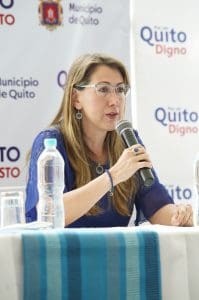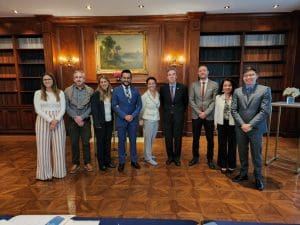One Lawyer’s Stand to Improve Access to Justice in Ecuador. Member Spotlight: Alicia Arias Salgado
Growing up in Ecuador, Alicia Arias Salgado has always been keenly aware of the injustice happening around her. The law is applied differently depending on who you are, and corruption abounds. As a law student, Alicia vowed to advocate for justice reform in her country. Now, she works as a lawyer, mediator and arbitrator to expand democracy and promote people’s access to justice. But she faces an uphill battle.
 Over the years, Alicia has worked with the American and Ecuadorean Chambers of Commerce and the National Court of Ecuador to improve access to justice reform initiatives. She emphasizes that small, measurable changes are often better received than dramatic, large-scale ones. Alicia cites the example of holistic women’s rights, that is, providing not only the legal option for divorce, but also economic advice, mental health services, and healthcare for women facing difficult situations.
Over the years, Alicia has worked with the American and Ecuadorean Chambers of Commerce and the National Court of Ecuador to improve access to justice reform initiatives. She emphasizes that small, measurable changes are often better received than dramatic, large-scale ones. Alicia cites the example of holistic women’s rights, that is, providing not only the legal option for divorce, but also economic advice, mental health services, and healthcare for women facing difficult situations.
“How can I work in a system that is not producing the expected results?”
Alicia notes the wide-spread and systemic challenges she encounters. Many judges and law enforcement officials are compromised by corruption, and there are significant discrepancies between what is taught in law schools across Ecuador. What’s more, judges often don’t understand gender issues, imparting a sexist dimension into an already problematic justice system.
Progress is still being made. Ecuador has a Mediation and Arbitration Law that allows citizens to reach final judgement agreements using these skills. Gradually, legal professionals are learning that this step is more than a formality–mediation can actually solve the conflict before it escalades to court. Alicia routinely seeks out the judges who want to do better but don’t know how. She works to build a network of like-minded lawyers in hopes of furthering Ecuador’s justice reform.
When former Ecuadorian president Rafael Correa attempted to weaken the role of civil society, Alicia worked alongside local Civil Society Organizations (CSOs) to project a united front in the face of this adversarial administration. She promoted active dialogue and helped to find alternative solutions within civil society’s legal frameworks.
“We from our country are the ones who have to change things.”
Since then, Alicia has advanced the Open Government Partnerships model as a Chief of Party for Ecuador at Counterpart International. She implemented a dialogue process across the country to hold roundtables with private and public sector representatives, citizens, and CSOs to identify the ten most important government projects to be implemented within the next four years. Through this process, Alicia’s team and government officials were able to build the National Plan presented to the Ecuadorian government. This framework–created entirely by and for the people–led to big changes in Ecuador. The government, with the support of different sectors, implemented 90% of the proposed initiatives, and these commitments continue to be monitored by several different CSOs.
Alicia, acting as Counterpart International’s Chief of Party for the Dominican Republic, utilizes her mediation skills in a bi-national conflict. The Dajabón River stretches across both Haiti and the DR, acting as a key source of water for both countries. There has been significant conflict over the construction of a canal, raising issues around water rights and environmental impacts. Alicia initiated a dialogue process to build locally-led, long-term resilience and to achieve significant environmental gains in the Dajabón watershed. She also coordinated activities among stakeholders to foster greater usability and accessibility of climate data for coordination and decision-making. Additionally, her work in the DR incorporates a diverse set of actors, such as national and municipal institutions, farmers’ and ranchers’ groups, and women and youth groups. Through Counterpart International, Alicia hopes to reach a smart compromise which prioritizes reliable and sustainable water management.
 Ever since the dissolution of USAID, much of Alicia’s work in CSOs has by necessity been subsumed by the national governments themselves. While it might be too soon to say, this increase of responsibility could put a strain on government resources and hinder progress. Alicia speaks about the need for CSOs to diversify their sources of funding. In a post-USAID world, it is of the utmost importance to be creative. There is no other option than for CSOs to continue with key actions and projects that impact peaceful development.
Ever since the dissolution of USAID, much of Alicia’s work in CSOs has by necessity been subsumed by the national governments themselves. While it might be too soon to say, this increase of responsibility could put a strain on government resources and hinder progress. Alicia speaks about the need for CSOs to diversify their sources of funding. In a post-USAID world, it is of the utmost importance to be creative. There is no other option than for CSOs to continue with key actions and projects that impact peaceful development.
“If people don’t trust you, no work will get done.”
When asked how CSOs can safeguard and even expand their influence, Alicia speaks about trust-building. It is necessary to build relationships with all sectors—including government authorities and community leaders, among others—to ensure the implementation of programs with the expected results and impact. Also, Alicia acknowledges that locals often know the problem better than organizers or government leaders. It is thus crucial to remain flexible and receptive to their feedback and advice. Finally, Alicia stresses that it is important for CSOs to prepare the successors of those in charge of an organization’s future. That way, there will be a smooth transfer of power and minimal loss of progress with each new change.
Alicia’s democracy-expanding projects have reached the World Bank, the United Nations, and the Inter-American Development Bank. She has also taught conflict management at the Universidad de las Américas law school.
Alicia cherishes her pro-bono work through the organization Blue Connection. There, she helps women and young people better manage conflict by teaching leadership skills, hosting workshops and conferences, and providing legal advice.
As a new member of MBBI, Alicia is motivated to get more involved in the community. She recently attended the International Peace Summit in Lima, where she learned about approaching ecological protection and sustainable development with a peacebuilding lens. Alicia’s sense of justice, rational approach to leadership, and persistent tenacity is surely changing Ecuador for the better, one step at a time.
Article by Elsie Aleck, MBBI Writer
